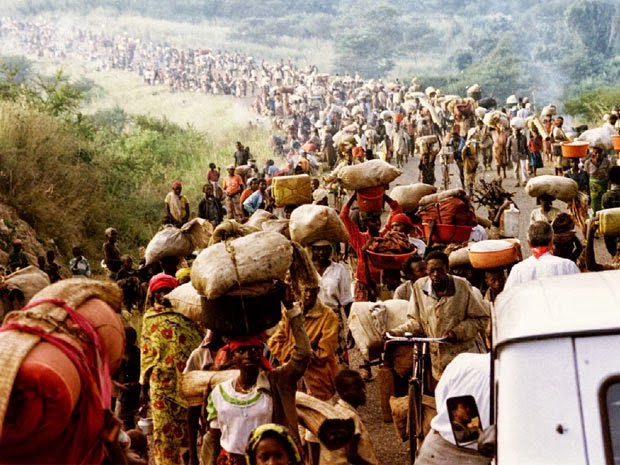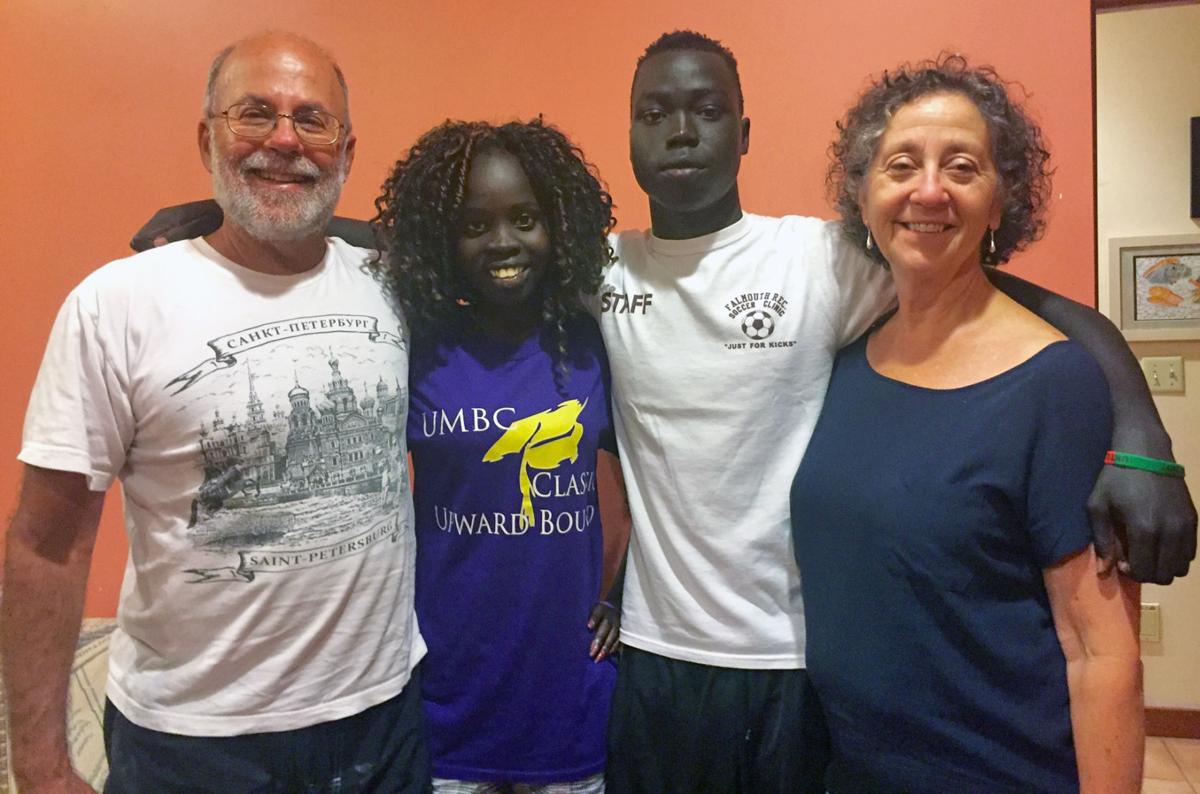Refugees Agut O. Odolla, 21, and Mapach O. Odolla, 16, spent this summer analyzing dirt samples and serving pie in Woods Hole, but the quiet lives that the siblings led over the past few months stand in stark contrast to the history of violence, struggle and displacement that they have survived.
Dr. Michael J. and JoAnn N. Fishbein hosted the siblings and have hosted members of the Odolla family at their home on Punch Bowl Drive for the past several summers. The couple met the family through their daughter, Emily H. Fishbein, who works for the refugee service that helped the family resettle in Baltimore from a Kenyan refugee camp.
Dr. and Ms. Fishbein said they did not know much about the siblings’ story when they first visited Cape Cod. “Little by little we learn these pieces, just by being with them a lot,” Ms. Fishbein said. “I think as we build a relationship and trust, we hear more.”
In an interview earlier this month, Agut and Mapach sat side by side on a large couch in the Fishbein’s television room to share their story in full.
Agut and Mapach grew up in Western Ethiopia outside of the city of Gambella, which is situated on the Sudanese border.
The Odolla family is part of the Anuak tribe, an ethnic group that considers itself indigenous to the Gambella region but which is now a minority in the area.
Their father was a farmer, and Mapach said that the ground in the tropical region, fed by the Boro River, was so fertile that their father never even had to water their crops.
On December 13, 2003, however, the family’s day-to-day life changed forever.
“That was the day they killed everybody,” Agut said. “In Gambella, it was Saturday around twelve o’clock, and that’s when the killing started.”
That December, under clear blue skies, the Anuak people were massacred in a genocide that killed about 424 people over the course of three days, according to the Human Rights Watch. Agut and Mapach said that the Ethiopian government and military, largely controlled by the powerful Nuer Tribe, carried out the attacks on their tribe.
“It was completely unexpected; it just happened out of nowhere,” Mapach said.
Some were killed in their homes. “If you would hide your husband, they would beat you until you told,” Agut said. “If they find the person they would just kill him in front of you, and leave you with the kids, or someone there would just rape you.”
Others, Agut said, were found during Saturday prayer and slaughtered in church buildings.
The Odolla family was spared from the initial violence of that day because their farm was located outside of the city. First word of the massacre came from friends and family members who had fled to take refuge at the family farm. The children’s father, who had been shopping in the city that day, did not return, and the family had no way of knowing whether he had escaped or been killed.
It wasn’t more than a few days before the Odolla children had to flee into the jungle as well, hoping their father was alive somewhere else.
Since then, thousands of Anuak people have fled Ethiopia, and ethnic tensions and violence continue.
“I guess it’s still happening today but no one will really talk about it,” Agut said. “One reason would be we are the minority. And, um, a lot of people are not really educated about it. And I think we don’t really have voice.”
Two years later, Agut, Mapach, their mother and five siblings were reunited with their father in a Kenyan refugee camp in Dadaab, where he had prepared a home for them.
Dadaab is a complex of five refugee camps, the largest in the world; according to the United Nations High Commissioner for Refugees (UNHCR), Dadaab currently holds more than 338,000 registered refugees, which is more refugees than currently live in the United States. If Dadaab were considered a city, it would be the fourth largest in Kenya.
In fact, the camp functions like an independent city in many ways. The UN gives building materials to refugees upon arrival at the camp, but the families are left to create their own shelter. Every 15 days the UN would provide their family with food, water, and firewood to cook with, but Agut said the rations were barely enough to keep them alive. As a result, the camp is a ramshackle of small businesses, as families try to supplement their limited resources; Agut and Mapach’s family made and sold a popular Ethiopian flatbread called injera.
Mapach was about six years old when his family first reached the refugee camp, and he remembers the lifestyle fondly.“Living there was fun,” Mapach said. He is an avid soccer player, and he developed most of his skills during his stay in Dadaab.
“Almost every boy plays soccer because if you don’t play, what do you do?” Mapach said. “There’s nothing else to do, except go to school and then go to soccer afterwards.”
Although the children were able to attend school while living in the refugee camp, Agut said the quality of their English lessons was poor.
“The problem was that the teachers were not really qualified to be teaching because they were just high school students who had just graduated” from the Dadaab schools, Agut said. The extent of their English learning was memorization of the ABC’s, their names, and a few other key words.
Although some refugees in Dadaab will spend their entire lives in the camp, the Odolla family was selected to leave after just a four-year stay. But even after being identified as candidates for resettlement, the interview process with the UN took two full years.
The UN selects and approves only those families who have the highest need for resettlement, evaluating how dangerous it would be for a family to return to their home country and the quality of life for them in Kenya. Less than one percent of the 14.4 million refugees across the globe are submitted to be resettled.
UN officials conduct a series of interviews with all of the family members, even the young children, to verify that their stories match up. Even the slightest deviation could mean rejection of the family’s application.
Dr. Fishbein said many people do not understand the in-depth nature of the refugee resettlement process when they talk about refugees, especially in current political debates about immigration.
“It’s really unfair because it’s probably the most vetted group that comes here,” Dr. Fishbein said.
After two years of interviews and waiting, in 2010 the Odolla family received notice that they would be relocated in the United States.
The International Refugee Committee (IRC), a nonprofit organization founded by Albert Einstein during World War II, provided a home and food for the family upon their arrival in Baltimore and helped them settle into their new home.
Ms. Emily Fishbein works for the IRC, and she was integral in helping the Odolla children integrate into local public schools through the Refugee Youth Project.
“We didn’t speak English or anything, and we just needed someone to be there,” Agut said.
Despite not being able to speak English, the children began taking classes as soon as they arrived in the city. Agut and Mapach took full-immersion English as a Second Language (ESL) courses with other refugees and immigrants, and although they picked up English quickly, Agut and Mapach said their first year was a difficult adjustment.
Now, Agut and Mapach can communicate their story in perfect English.
The children were bullied because of their skin color, a concept that Agut said was completely foreign to them. She remembers boys following her to class, taunting her for being “too black” and “ugly.”
“I cried most of the time when people talked about my skin color because it hurts so much,” she said in a written speech. During those early years, Agut spent hours in her room crying after school.
“They come here after enduring a lot obviously, and they had this hope that things will be better, and it is in a lot of ways,” Dr. Fishbein said. However, he said that isolation was a major issue for the children and their parents, who were the only Anuak family in the city.
The transition was particularly difficult for Agut, who had been educated to a 5th grade level while in the Kenyan refugee camp, but was forced to skip middle school in the US because of her age at 16 years old.
“When I got here they told me I was old enough to go to high school and I was like, ‘But I don’t speak English so how is this going to work?’” Agut said. Twice a week Agut attended an optional after school tutoring program with nearby college students, where she learned to read and write.
Despite the fact that she did not speak English when she first enrolled at the school as a freshman, Agut graduated as valedictorian of her graduating class in 2014, and her explanation of her success reads as a bit of an understatement.
“I studied a lot,” Agut said. “By working hard and believing in myself, I did it.”
In her valedictorian speech, she wrote:
“I realized that people talk about others in order to make themselves feel better…They are the ones who are unaware about the vast world out there, the differences other people embody and the many cultures of this world. Once you learn to respect other cultures and embrace difference, you can truly work well with others and create change.”
After graduating as valedictorian, Agut received a full-ride scholarship to McDaniel College in Maryland, where she will be a junior this fall. Agut studies political science and international relations. She hopes to go to law school and eventually work with the UN or for an NGO that protects human rights.
“Maybe me working at the UN will help other people too,” she said.
Mapach will enter into his sophomore year in high school this fall, and he hopes to play soccer for a Division 1 university after he graduates. Practiced from his days in the refugee camp, Mapach has played on his school’s varsity soccer team since freshman year.
Mapach and Agut have been working full time in Falmouth this summer, Mapach at Pie in the Sky and Agut at the US Geological Survey in Woods Hole. When asked how people in Falmouth have reacted to hearing their story, Agut and Mapach said most people do not know it very well.
“I don’t really tell people my story if they don’t ask,” Agut said. “If you don’t ask, then maybe you don’t wanna know.”
On weekends, the siblings spend time exploring Cape Cod with Dr. and Ms. Fishbein, sailing, fishing, and taking bike rides.”People in Falmouth are really nice,” Mapach said.
Agut and Mapach left Cape Cod on Monday, August 15, to return to Baltimore, and Dr. and Ms. Fishbein said they will miss their young energy and helpful spirit.
“It’s given me a better appreciation about how comfortable my life is and how fragile life is for so many people around the world,” Ms. Fishbein said.
Dr. and Ms. Fishbein have lived in Falmouth on and off since 1983. Ms. Fishbein is a social worker for Hope Hospice on Martha’s Vineyard, and Dr. Fishbein is a radiologist with Cape Cod Health Care.

